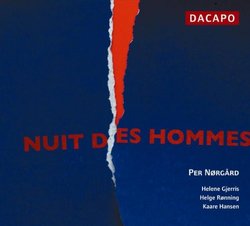One of the oddest but most fascinating of contemporary opera
Christopher Culver | 07/25/2006
(5 out of 5 stars)
"The war-themed "Nuit des hommes" (1995-96) is Per Norgard's fifth opera, although it really stands on the border between opera and oratio. Suggesting an oratio, the work has only two singers, the instrumentation consists only of string quartet, percussion, and electronics, and instead of a conventional libretto a body of disparate Apollinaire poems. Like an opera, however, we get a story--the poems are shanghaied into something approximating a plot--and there is a strong visual element, for the singers really do have to act. It's an extremely unconventional work in many ways, but fascinating and yet another breakthrough by this most innovative of modern composers.
World War I holds a special importance for Norgard because he sees it as the foundation of the horrors that followed throughout the 20th century, such as the Holocaust and the Cold War, and even up to today with tribalism and terrorism. Of the various poets who fought in World War I, Apollinaire was one of the most successful in communicating the insanity of the war, the ability of the fighting to strip soldiers of their humanity and leave everyone wandering in irrationality. Per Norgard and Jacob F. Schokking arranged selected poems and divided their texts between a mezzo-soprano and tenor in such a way that we have a story about husband-and-wife "Alice" and "Wilhelm". For example, the first scene of the main drama uses a poem about a meal to show tranquil home routine before the darkness of war overshadows domestic bliss. The poem "The Man God" is sung by Wilhelm, now representing all men besides being a husband to Alice, to describe the hubris and lust for power that brought Europe into the war. Once Wilhelm goes off to fight, with Apollinaire's military imagery as dialogue, Alice becomes a war correspondent stoking the flames of bellicosity. Yet, in a remarkable transformation, she also is Kali the destroyer, who gorges on the blood of the fallen soldiers with sexual pleasure.
Norgard's music seems somewhat detached from the series of theoretical developments he has explored from the 1960s. There's no consistent basis in the infinity series, or any strict application of Wolflian idyll-and-catastrophe, or the interest in multiple tempi of his piano concerto of around the same time as this opera. Instead, the music tries to faithfully reflect the action of the drama. Domestic scenes are accompanied by warm chamber music, while for the war there is a really clever application of electronic sounds (developed in collaboration with Gert Sorenson). This use of the music to focus the listener on the horrors of war might not provide as endlessly rich analysis as Norgard's pieces based on the infinity series, but the score is nonetheless powerful, often harrowing listening. The performances are excellent, with Helene Gjerris in the mezzo-soprano role, Helge Ronning as tenor, a string quartet of Danish musicians, and noted percussionist Gert Sorensen.
The CD comes with a full libretto and general comments about the work. In fact, there's more here than one would expect from a mid-price CD. One regrets, however, that there's little discussion of the music itself. We don't get a musicological analysis, or some description of the electronic gadgetry used.
If you've never are curious about Norgard's work, but have not yet heard any, try a more typical example like the Third Symphony (often considered his masterpiece) or "Terrains Vagues" first. But if you are a fan of his music, or just looking for an excellent modern opera about one of the darkest hours in history, this is worth picking up."

